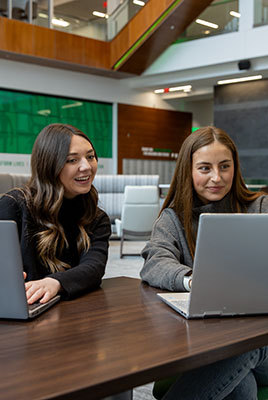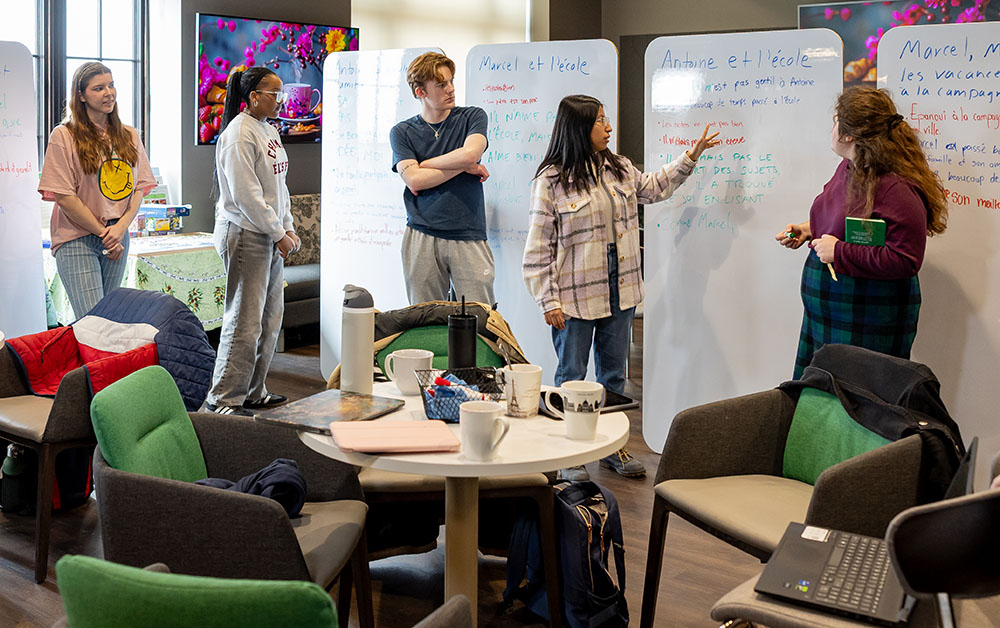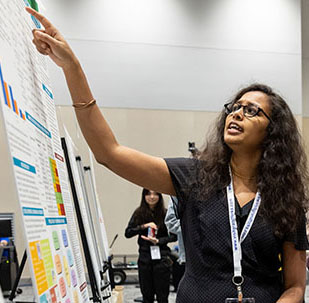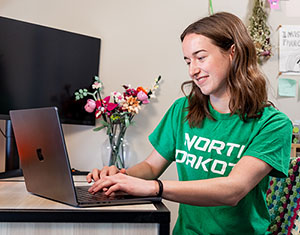Alternative Assessments to High Stakes Exams
When preparing for upcoming exams, instructors should carefully consider the assessment needed to meet their learning objectives. Our course alignment tool is a great starting point for choosing measurable action verbs to construct learning outcomes or objectives utilizing Bloom's Revised Taxonomy. The tool indicates cognitive complexity, lower or higher order thinking, and passive or active learning. Each level also includes examples of activities and assessments that align with the measurable action verbs that can assist you in course alignment.
What are Alternative Assessments
Alternative assessments are innovative approaches to evaluating student learning that go beyond traditional exams and standardized tests. Instead of asking students to recall memorized information, alternative assessments challenge students through meaningful and authentic tasks. These approaches often accommodate diverse learning styles and encourage deeper engagement with course material. The following guide is intended to help provide you with some quick resources for alternatives assessments. You are encouraged to use these, create your own, or some combination thereof. TTaDA is here to support faculty teaching and professional development.
Why Use Alternative Assessments?
- Promote deeper learning and long-term retention.
- Support diverse learners by offering varied ways to show knowledge.
- Encourage transferable skills, such as communication, collaboration, and problem-solving.
- Foster student motivation through more relevant and engaging tasks.
- Reduce academic dishonesty by using unique and personalized assignments.
Examples of Alternative Assessments
Self and Peer Assessments

Self and peer review are valuable forms of alternative assessment that promote critical thinking, reflection, and learner autonomy. This process not only encourages deeper engagement with the learning material but also helps students develop evaluative and feedback skills.
Self-assessment
Self-review is a form of alternative assessment where students evaluate their own work against a set of criteria or learning goals. It encourages learners to reflect on their strengths as well as potential areas for improvement. Engaging in this process builds self-awareness and critical thinking skills while encouraging students to take greater responsibility for their own learning. Exam Wrappers are a great example of a self-assessment activity that can be paired with high stakes exams. With exam wrappers students are asked to reflect on their exam readiness and study strategies pre and post exam. Visit the APA article about Exam Wrappers for more information including a downloadable sample.
Peer-assessment
Peer-review is an alternative assessment method where students evaluate each other’s work using clear criteria or rubrics. This process encourages critical thinking, collaboration, and self-reflection. Through guided practice, students also develop the valuable skill of giving constructive feedback, learning how to communicate suggestions respectfully, focus on specific improvements, and support their opinions with evidence.
Using the Self and Peer Assessment Tool in Blackboard
Blackboard includes a built-in Self and Peer Assessment tool that supports both formative and summative assessment tasks. Instructors can create assignments where students submit their work and are then assigned to evaluate their own or their peers' submissions.
Individual and Group Student Presentations

Student presentations, whether delivered individually or in groups, are a great form of alternative assessment that enables learners to showcase their creativity and both written and oral communication skills. Unlike traditional exams, presentations encourage students to synthesize information, organize ideas clearly, work with multimedia tools, and engage with their audience. Group presentations build collaboration and team-work skills.
Presentations can also serve as an alternative to written assignments, providing students with a different way to express their learning. This aligns with the principles of Universal Design in Learning (UDIL), which encourages offering multiple means of representation to support learner diversity while accommodating different learning styles, language proficiencies, and accessibility needs. For more information visit our Universal Design in Learning (UDIL) webpage or attend one of our workshops.
To support the creation and sharing of student presentations, Blackboard integrates with multimedia tools like YuJa and VoiceThread.
Poster Presentations

Poster presentations give students the opportunity to synthesize and visually communicate complex information in a concise format. Additionally poster presentations allow students to showcase their own research and practice their written and oral communication skills. Poster presentations are well-suited for individual or group work and can be used in face-to-face or online learning environments.
The Teaching Transformation and Development Academy (TTaDA) has UND branded poster presentation templates available for download. These templates are designed to be used with Microsoft PowerPoint and include two, three, and four column layouts for users to choose from.
Role Playing
Role playing is a form of alternative assessment that allows students to immerse themselves in real-world scenarios by adopting specific roles. It encourages active learning, critical thinking, empathy, and communication, making it especially effective in disciplines such as health care, education, business, law, and social sciences.
Through role play, students practice problem-solving, active listening, and collaboration while exploring multiple perspectives. Role playing can be conducted in real-time in face-to-face classrooms or asynchronously online.
Blackboard's AI Design Assistant
With the introduction of the AI Design Assistant in Blackboard, instructors can now leverage AI Conversations: Role Play to easily create immersive, scenario-based assessments using an AI Persona. Instructors create the scenario, describe the AI persona, and set the tone and complexity level allowing students to engage in a guided dialogue, practice decision-making, and respond to simulated situations. Examples include:
- Nursing: Conduct a patient intake interview or deliver post-operative care instructions.
- Education: Handle a parent-teacher conference or manage a classroom behavior issue.
- Business: Negotiate a contract with a client or resolve a customer service complaint.
- Marketing or Graphic Design: Meeting with a client to discuss project details.
- Law: Interview a client or cross-examine a witness.
- Social Work: Conduct a needs assessment with a client in crisis.
- Psychology/Counseling: Practice a therapy intake session or respond to a distressed client.
- Public Health: Communicate vaccine information to a hesitant patient.
- Environmental Science: Advocate for policy changes in a town hall meeting scenario.
- Criminal Justice: Role-play a police interview or mediation with community members.
- Foreign Languages: Engage in everyday conversation with a native speaker persona.
For additional information visit our Blackboard AI Design Assistant web page.
Reflective Journaling
Journaling is a formative assessment strategy that encourages students to engage in personal reflection on their learning experiences and the course content. Rather than testing memorization or content recall, reflective journaling fosters critical thinking and self-awareness.

Reflective Journaling and Classroom Assessment Techniques
Reflective journaling can be enriched by incorporating formative Classroom Assessment Techniques (CATs), such as the Minute Paper and Muddiest Point, from Classroom Assessment Techniques: A Handbook for College Teachers by Thomas Angelo and K. Patricia Cross. In the Minute Paper students are asked to share their top take-aways from the class or unit as well as any areas that remain unclear. In the Muddiest Point students list any areas of content that remain "muddy" or confusing.
Using the Journal Tool in Blackboard Ultra
Blackboard Ultra includes a built-in Journal tool that can be used for student reflective writing as well as Classroom Assessment Techniques (CATs). In addition to answering written prompts, students can also embed images, links, and videos in their journal entries. Educators can provide comments on the students journal entries and evaluate them using Blackboard rubrics to ensure consistency in grading.
Additional Alternative Assessment Strategies
Some additional alternative assessment strategies include:
- Portfolios
- Concept mapping
- Annotated bibliographies
- Case study analysis
- Simulations
- Digital storytelling
- Infographics
- Podcast
- Debates
- Problem-based learning (PBL) tasks
- Service learning projects
High Stake Exams
TTaDA recognizes that it is sometimes necessary to give high stakes exams as it helps prepare students for board or certification testing they will need to complete for their discipline. Instructors determining that an exam with some level of security is a necessary component of the assessment process in their course should consider the various exam security options available.
Learn More About Exam Security Options
For more information or questions, please contact us at 701.777.3325 or 701.777.2129 or send an email to TTaDA@UND.edu or blackboard@UND.edu.